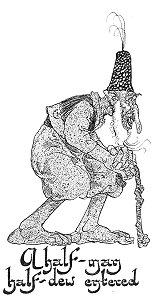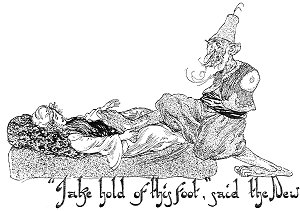
Sacred Texts Asia Index Previous Next

Forty-four Turkish Fairy Tales [1913], at sacred-texts.com
 |
 |
Thus abandoned, the maiden looked about everywhere, and finally set out in a certain direction. She wandered long up hill and down dale and across plains until she reached another mountain, whence she saw a palace. When she came up to it she opened the gate, and entering, could see no one about. Going into the kitchen, she noticed the carcass of a sheep hanging from the wall. "Now,"
thought the maiden: "There must certainly be some one living here, as the sheep is intended for food." She then cut up the sheep and put it into the oven to cook; when cooked she set it in dishes and put it in the cupboard. That done, she turned her attention to the room and set everything in order; filling the mangal, preparing the coffee, and laying the table.
Towards nightfall she heard approaching foot steps, and had just time to hide herself before the door of the serai was opened and a being, half-man, half-dew, entered.
 |
At these words the maiden came from her hiding-place and timidly approached the Dew, who seeing her, smiled and said: "My blessings on thee, child! Who art thou? Whence comest and whither goest thou?" She answered "I am alone in the world. Wandering about in the mountains I chanced to find this place." Then said the Dew: "My child, thou shalt be my daughter for ever; I am lonely and old. This serai shall be thine. Have no fear, but go about thy daily work and spend the afternoon in amusing thyself." They sat with each other for a while, and afterwards retired to rest.
 |
Next morning the maiden rose betimes, and when the Dew had drunk his coffee, smoked his chibouque, and eaten his meal, he said to her: "My child, I am now going out. Here is a key; unlock the door of that room. An Arab is in there; tell him thy clothing is dirty and he will give thee clean linen. Put it on and be at peace." At these words he was gone.
Opening the door of the room indicated she called "Dady!"
and an Arab instantly presented himself. Her wishes were hardly expressed when the Arab disappeared and quickly returned with a bundle of clean linen, which the maiden took and presently put on. Before leaving her the Arab said: "When thou art weary, take a walk in the garden." So when all her work was finished, the maiden went into the garden. Here, floating on a pond, she saw a duck whose wings and head were of diamonds. No sooner did the duck espy the maiden than it shrieked aloud: "O thou shameless one! Art thou come to take away my Shahzada?" Its wings flapped so furiously that one of them broke off. Alarmed, the maiden cried: "O woe is me! Why did I come here? When the Dew-father sees what has happened he will surely kill me!" and ran back into the palace.
In the evening the Dew returned, and they both ate and drank together. It was evident that the Dew was not aware of what had happened in .the garden, so when bedtime came they retired to their respective apartments without reference being made to the incident.
Next morning the Dew requested the maiden to go and obtain fresh linen from the dady. This she did after the Dew's departure, and the Arab, as before, advised her to go into the garden. As soon as the duck caught sight of her it exclaimed angrily: "Hast thou decked thyself out with thy finery to take away my Shahzada?" It quacked at such an astonishing rate that its other wing broke off. Fearing the Dew-father's wrath, the maiden ran back into the palace as fast as she could.
Night fell and the Dew came home as usual. They ate and drank together, and as the Dew made no reference to the affair of the duck the maiden retired peacefully to her chamber and slept well. Next day the Dew went out again, while the maiden changed her clothing and repaired as usual to the garden. This time, at seeing her, the duck set up a loud shriek and its head fell off; thus it died.
Now this duck was the Dew's daughter, with whom a certain Padishah's son had fallen violently in love. This Prince used to visit a kiosk, the
garden of which adjoined that of the Dew, and thus he first saw the lady, who, for reasons of her own, not wishing to be seen again by the Prince, changed herself into a duck and swam about on the pond. The youth had been a witness of all that had happened and heard the words spoken by the duck. When he saw that the maiden was more beautiful than the Dew's daughter had been, he loved her with all his heart. The maiden, on her part, knew not who the duck was; she thought merely that it was the Dew's duck, and feared he would be so angry, when he knew what had happened, that he would kill her without mercy. When she saw, however, that the Dew made no reference whatever to the matter she gathered courage. Yet every morning when the Dew went away the old fear returned lest he should discover it and wreak his vengeance upon her.
 |
Having read the missive the Dew replied verbally: "Tell the Padishah that my daughter is at his disposal; but I am very poor, so that more than my daughter he must not expect. If he agrees, the betrothal may take place next week. Tell him further, however, that as I am a very poor man he must not bring a retinue exceeding a thousand persons, as that number is all I could entertain." The King's servant departed and delivered the Dew's message to his master.
On the morning of the appointed day the Dew gave the maiden a bunch of keys, saying: "My child, take these keys; open such and such rooms, clap your hands and many slaves will appear. Do not be afraid of them." She did exactly as she was told, and in a short time had gathered around her a host of slaves of all sorts, white and black, male and female, who kissed the hem of her garment and made reverential
salaams. She led them all before the Dew, who apportioned to all their duties.
The gates of the palace were thrown open and the Padishah and his thousand followers entered for the solemnization of the betrothal. The ceremony concluded, a rich banquet was served, after which the royal guest and his gorgeous retinue took their departure. At leave-taking the Dew observed to the Padishah: "When sending for the bride, O King, send only five hundred carriages for her trousseau, for I am too poor to give more." Then as a farewell gift he presented a magnificent garment to each of the thousand men.
A week later five hundred carriages were sent to the Dew's palace for the bride's trousseau, and with them came the Padishah's own state coach for the accommodation of the bride herself. The vehicle, however, failed to please the Dew, who ordered his slaves to bring out the least splendid of his equipages for his adopted daughter's use. Such a superb coach had never been seen before at the palace of the Padishah, where in due course the maiden arrived. The wedding took place with great ceremony, and was accompanied by forty days and forty nights of feasting and revelry.
Time passed away quickly with the happy couple, who lived together in unalloyed bliss. One day the Shahzada went on a long journey. During his absence his wife was taken ill; slaves were dispatched in all haste for the physicians. None of them, however, seemed able to do her any good, and for three days and nights she suffered such pain that it was thought advisable to send for the Dew-father.
Hastening to the maiden's side, the old man said: "Grasp my arm, child!" As she did so, lo! the arm broke off as though it were made of some-brittle substance, and the sufferer moaned: "Woe is me! my dear father's arm is broken!" The Dew, however, consoled her, saying: "It matters not, my child." Turning to one of the slaves he said: "Take it, and set it in the corner." No sooner was this
done than the arm blossomed forth into a diamond-tree. As he turned his other arm to his daughter she grasped it, with similar result--this arm likewise broke off, fell to the floor, and was transformed immediately into another diamond-tree.
 |
Among them were the parents of the young woman, though they were unaware that it was their
own daughter. Just as they arrived the Princess and the Shahzada were at dinner in their room. The Princess recognized her parents immediately, though they did not know her. As for the old Padishah, his eyes were constantly on his daughter, whose appearance he could not help admiring. Numerous slaves were standing round.
The old Padishah picked up a towel and a can of water. "Sultana," he said to his wife, "let us get nearer to these slaves." "I will take this towel and you pour the water; while doing so, we can get a closer view of the Princess." The meal finished, the old couple approached the Shahzada and the Princess and did the office of slaves in washing and wiping the latter's hands. In the midst of this performance the Princess exclaimed: "My dear father, when thou didst ask my desire, and I answered that my mother should hold the basin and thou shouldst hold the towel for me, thou wert angry and didst drive me from home. Now behold what a great journey thou hast made with my mother to do those same things. Thus it is clear that the wish I then expressed did not originate from myself; consequently thou wast wrong in driving me away."
To this the Padishah replied: "I was wrong, my daughter. May Allah pardon me my sin, and do thou also pardon me. Thy wish has now been fulfilled." Thus parents and child became reconciled, and forty days and forty nights of festivities celebrated the happy event.